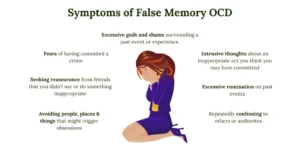
False Memory OCD, also known as Misinformation OCD or Delusional Memory OCD, involves an intense preoccupation with the belief that a particular event took place—even when there’s no evidence it actually happened. These imagined events feel very real and can cause a lot of emotional distress. This ongoing anxiety can make daily life feel exhausting and difficult to cope with. If you or someone you know is struggling with this, getting professional help can make a big difference and lead to a healthier, more balanced life.
There’s no single cause of False Memory OCD. For some, it might begin after going through a stressful or traumatic experience, like an accident they believe was more serious than it actually was. Others may develop it after experiencing abuse or long-term emotional pain. Often, this condition is tied to other mental health issues like anxiety or depression, which can make the mind more prone to confusion, doubt, and obsessive thoughts.
People who struggle with False Memory OCD often face a specific set of symptoms that revolve around memory and doubt. These may include:
- Ongoing, obsessive worries about forgetting important things—like details from past conversations or significant events.
- Disturbing flashbacks or mental images that seem to suddenly appear, often tied to events the person had previously forgotten. These moments can feel emotionally intense and confusing.
- A strong urge to repeatedly check calendars, notes, or messages to make sure nothing has been overlooked or remembered incorrectly.
- Constant anxiety about having memory lapses or not being able to trust your own recollection of events.
- Frequently asking others—friends, family, or partners—for reassurance that your memory is accurate or that certain things actually happened.
- Feeling overwhelming guilt or shame if you think you’ve misremembered something or made a mental mistake.
- Ignoring or dismissing clear evidence that goes against your belief, even when people you trust try to reassure you that your memory is okay.
Obsessive Thoughts in False Memory OCD
People with False Memory OCD often deal with intense, unwanted thoughts that can take over their minds and disrupt everyday life. These obsessive thoughts may look like:
- Constantly second-guessing whether their memories are real, and worrying that outside forces—like someone else’s influence or manipulation—may have altered them.
- Feeling unsure about the accuracy of past events, often changing or adding details in their minds that didn’t actually happen.
- Becoming overly focused on the idea of having false memories, and spending lots of time researching the topic or looking for signs that something is wrong.
- Developing a deep fixation on how memory works and the ways it could be changed—especially by things like hypnosis, medication, or psychological influence.
- Feeling anxious that their own memories have been changed without their knowledge, or worrying that other people’s memories might not be trustworthy either. This can lead to obsessive self-monitoring and the need to “prove” that their memories are real.
Compulsive Behaviors in False Memory OCD
When someone struggles with False Memory OCD, they often develop repetitive behaviors as a way to ease their anxiety and doubts about their memories. These actions, although meant to bring relief, usually end up fueling the cycle of worry. Some common compulsions include:
- Constant mental replaying: Individuals may find themselves going over past moments in their head again and again, analyzing every word or detail, trying to figure out if their memory is correct or flawed.
- Frequently asking for reassurance: It’s common for those affected to repeatedly ask friends or family to confirm what happened in a certain situation. They may keep returning to the same questions, hoping to feel certain—but that sense of certainty rarely comes.
- Rechecking habits: To feel more confident in their memory, they might double- or triple-check things like whether the door is locked, the stove is off, or if they really completed a task. These checking routines can become exhausting and time-consuming.
- Avoiding triggers: Out of fear that a memory might be questioned or confused, some people start avoiding places, people, or situations that might remind them of uncertain or troubling events.
- Trying to block out certain thoughts: In an effort to escape the distress that comes with doubtful memories, they may try to push those thoughts away. Ironically, the harder they try not to think about something, the more it seems to stick around—making them feel even worse.
False Memory OCD is a challenging form of OCD marked by intrusive doubts about past events and persistent fears of having misremembered or caused harm. These false memories can lead to overwhelming guilt, anxiety, and compulsive behaviors like mental reviewing and constant reassurance-seeking.
Though distressing, False Memory OCD is treatable. With proper therapy—especially Cognitive Behavioral Therapy (CBT) and Exposure and Response Prevention (ERP)—individuals can learn to manage their thoughts, reduce compulsions, and regain trust in their memory. Early treatment and support are key to recovery and improving quality of life.
You can write to us: info@emotionoflife.in or reach out us via call 9368503416 or visit our website- www.emotionoflife.in
